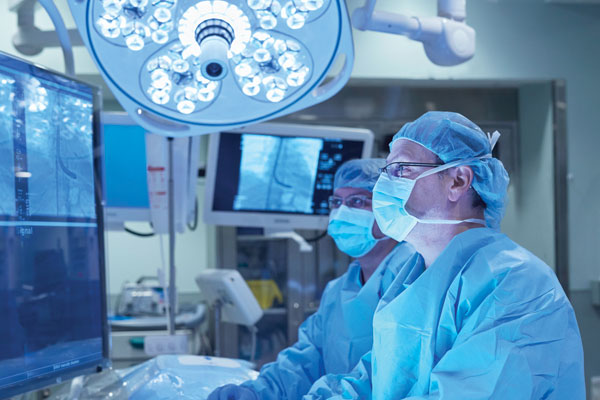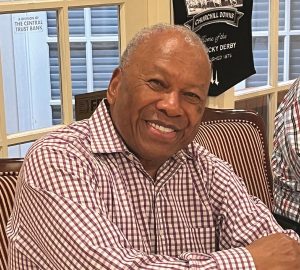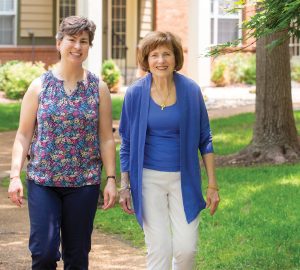Heart disease can be an uphill battle. It’s the leading cause of death among adults, and it racks up a staggering $300 billion in U.S. health care costs each year. But SLUCare physicians have an arsenal of modern methods for improving cardiovascular function and saving patients’ lives, says cardiologist Dr. Tarek Helmy, who practices at SSM Health Saint Louis University Hospital.
One of those methods is a procedure called same-day PCI, or percutaneous coronary intervention, an angioplasty technique that uses a small, inflatable device to open coronary arteries clogged with plaque due to atherosclerosis. Surgeons make a small incision in the patient’s wrist or groin and pass a catheter through the artery until it reaches the blockage. They inject contrast dye and use imaging technology to view the obstruction. A small balloon is guided to the area and inflated to compress the plaque against the artery wall, and a stent can be placed to keep the vessel open. Some patients receive a treated stent that releases medication to prevent scar tissue from reblocking the vessel.
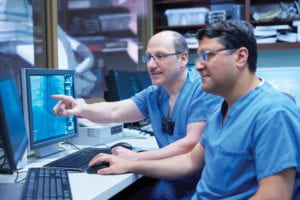
It’s safe to send PCI patients home the same day when they meet certain criteria, Helmy explains. “If the results of the procedure are satisfactory, they have someone to help them at home, they feel good and there’s no bleeding, we normally can discharge them,” he says. “The patient can have the procedure in the morning, stay in the hospital’s recovery area for 4 to 6 hours, then go home in time for dinner. Patients see that as a real benefit.” People who live outside the St. Louis area can be discharged if they have someone to stay with them at a house or hotel, he says. Helmy notes that occasionally, a PCI patient needs to stay in the hospital for further observation.
In the days following the procedure, doctors follow up to make sure the patient is doing well. Every individual reacts differently to medical procedures, so careful monitoring is important, Helmy says. Following PCI, there are some temporary restrictions on activities like lifting, exercising and bathing, but they are minimal, especially when the wrist is used as the entry site. “It’s the favored method,” Helmy explains. “The wrist area is easier to take care of and keep clean, bleeding risk is lower, and it’s easier for the patient to move around afterward.”
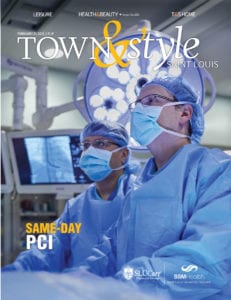 PCI may be performed in patients whose coronary artery disease is not responding well to medication or other treatments, Helmy says. Symptoms of the condition include chest pain during physical activity, shortness of breath, paleness, clammy skin and fatigue. “A coronary artery blockage limits blood flow to the heart muscle,” he says. “When the heart is working harder during exercise and exertion, there’s a mismatch between what the heart muscle needs and what the diseased artery can supply.” Once the person rests, however, pressure on the heart muscle is reduced,
PCI may be performed in patients whose coronary artery disease is not responding well to medication or other treatments, Helmy says. Symptoms of the condition include chest pain during physical activity, shortness of breath, paleness, clammy skin and fatigue. “A coronary artery blockage limits blood flow to the heart muscle,” he says. “When the heart is working harder during exercise and exertion, there’s a mismatch between what the heart muscle needs and what the diseased artery can supply.” Once the person rests, however, pressure on the heart muscle is reduced,
heart rate falls and symptoms tend to decrease. This may cause the patient to wrongly believe the problem is just temporary, Helmy cautions. And some patients have less common symptoms that can be mistaken for other conditions, so he notes it’s important to know what to look for. “Women, diabetics and seniors may experience other issues besides chest tightness, trouble breathing and tiredness,” he notes. For example, women may have pain or pressure that travels to the arm or jaw, a burning sensation in the chest, dizziness, sweating or nausea.
“Whenever you have symptoms that could signal heart disease, you should consult a doctor right away,” Helmy advises. “Early diagnosis and treatment are very important, and so are lifestyle changes. Atherosclerosis typically is a disease of middle-aged and older patients, but sometimes younger people experience it due to heredity, high cholesterol, diabetes, hypertension or smoking.” You can’t control aging or a genetic predisposition to disease, but you can lower risk by exercising, eating a healthful diet, avoiding smoking, and keeping an eye on cholesterol, diabetes, blood pressure and other heart health factors, he says.
A recent SLUCare patient says he had a great experience with same-day PCI. He arrived at SSM Health Saint Louis University Hospital at 7 a.m. and was back home resting several hours later. “For what the treatment entailed, including the stent I needed, the process was very efficient and the recovery time was short,” he notes. “I only took off work the day of the procedure, and I was able to take my kids trick-or-treating the next night.” He describes the medical staff as “fantastic” and says they kept him fully informed of test results and treatment processes. He also appreciated the cardiac rehab therapy he received, which helped him heal safely. “The SLUCare team has been great to me,” he says. “For something as potentially severe as my condition was, they made the process as easy as possible.”
SLUCare Physician Group offers modern, comprehensive services in cardiovascular care. Pictured on cover: SLUCare cardiologists Dr. Elsa Abo-Salem and Dr. Tarek Helmy. For more information, visit slucare.edu/cardiology or call 314.977.4663.
Cover design by Allie Bronsky
Cover photo courtesy of SLUCare Physician Group
Pictured at top: SLUCare cardiologists Dr. Elsa Abo-Salem and Dr. Tarek Helmy in the operating suite.
Photos courtesy of SLUCare Physician Group





